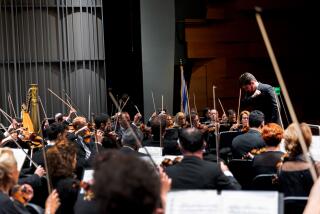Rediscovering Liszt--in Quadruplicate
- Share via
The name of Franz Liszt isn’t usually included in the short list of composers you must love in order to be considered civilized, despite the efforts of such advocates as Ravel, Bartok and Boulez to elevate him to the loftiest status.
But mention Liszt’s B-minor Sonata to any pianist, even one who might not otherwise cotton to the composer, and you’d best smile--or at least frown portentously. Liszt may not be everyone’s beloved master, but he did (it’s said) create a masterpiece in this vast outpouring of emotion that is also as thorough a test of piano technique as exists.
This listener rejected the Sonata, along with everything else by the composer, long ago. But the thunderbolt still strikes: a work of art inexplicably kicks in, touches a nerve, triggers a positive response.
It happened with the arrival of the dubious gift of four new recordings of Liszt’s mighty monster in the same week.
Sampling at least one was unavoidable, with Alfred Brendel’s (Philips 434 078) chosen as potential icebreaker, Brendel being a satisfyingly rational artist who tells music like it is.
Two days and four recordings later, Liszt’s B-minor Sonata was all that mattered in this world.
Brendel gives the illusion of being swept away while in reality never losing control of all that theatricality, and projecting with optimum clarity Liszt’s unearthly, futuristic harmonies.
The performance is hugely persuasive: taut but not constricted, blazing with rhythmic life. And while we rarely think of Brendel as a colorist, there’s enough color here to fill a paint catalogue. But it is never indiscriminately daubed.
The Russian pianist Nikolai Demidenko is a very different, more immediately impressive protagonist.
In his gorgeous-sounding recording of the B-minor Sonata (Hyperion 66616), Demidenko gets more out of his piano (credited simply as “Steinway”) than might be thought possible of any mere mortal: an unlikely combination of prime Horowitz and prime Gieseking. The range of colors is astonishing in its breadth, the power awesome.
But while Demidenko gets everything and then some out of his instrument, he gets remarkably little out of Liszt. Once the listening process is finished, one is left with the feeling of having heard a vast quantity of not particularly articulate sound.
Everything is writ large, including the pianissimos and silences. Demidenko begins more slowly and softly than any pianist within memory. But he fails to build a structure--or a continuum--thereafter. The dynamic scale is exaggeratedly broad, tempos are wildly contrasted, with the artist’s spectacular digital and coloristic command continually drawing attention away from the music itself. This is a performance that should be given in costume.
It was a relief to come down from those giddy heights to the clean, uncluttered but by no means workaday playing of the prolific Hungarian, Jeno Jando.
Jando’s batting average remains hearteningly high with this Liszt Sonata (Naxos 8.555010, budget): an athletic, keen-edged reading that convinces less through grandeur than a combination of nervous intensity and structural logic. And how Jando loves the fugal passages, projecting them with the crystalline clarity of the true Bachian, without going to Glenn Gould-like extremes of sec over-articulation.
If Demidenko’s downfall is an excess of personality, Barry Douglas goes to the opposite extreme, facelessness, in his underpowered reading of the Sonata (RCA Victor 61221): a series of fragments rather than a structured entity. Too bad, since it comes as part of an otherwise well-executed, intelligently contrived program including some boldly forward-looking Liszt miniatures, the Berg Sonata and Webern’s Variations.
The other three CDs are all-Liszt, with Brendel scoring particularly with a stark, crushing “Funerailles” and Jando offering an exquisitely songful “Vallee d’Obermann.”
More to Read
The biggest entertainment stories
Get our big stories about Hollywood, film, television, music, arts, culture and more right in your inbox as soon as they publish.
You may occasionally receive promotional content from the Los Angeles Times.










